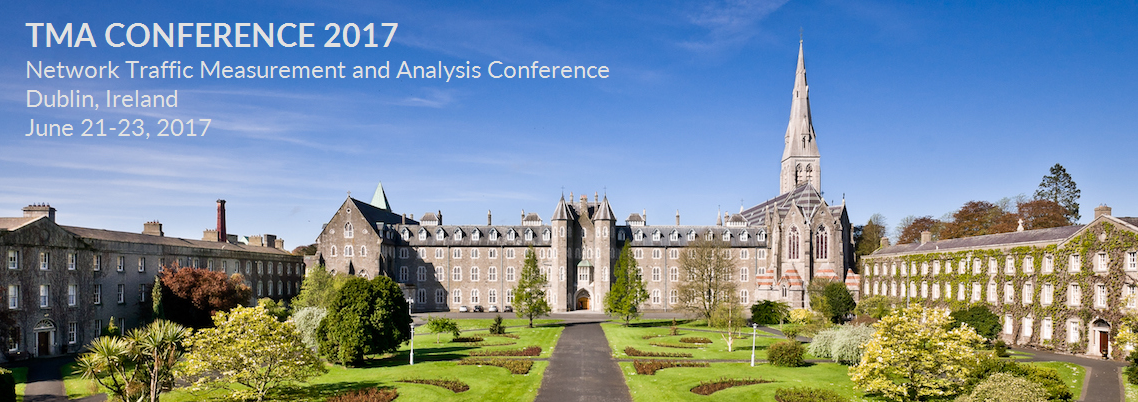IEEE/IFIP TMA Conference keynotes
- Wednesday, June 21st at 9:00
Steve Uhlig: Network Measurements as a Hammer in Your Research Toolbox
- Thursday, June 22nd at 9:00
Narseo Vallina-Rodriguez: Crowdsourcing Network and Traffic Measurements to Illuminate the Mobile Ecosystem
Wednesday, June 21st – 9:00 – Speaker: Prof. Steve Uhlig – Video of the Keynote
Abstract
In this talk, I will share my experience in building a research career, and the role network measurements of different types have played, including traffic traces, server logs, routing information, and DNS measurements. Despite network measurements (both active and passive) being my main hammer to perform research, building a successful research career requires going beyond measurements. Indeed, network measurements are useful for making observations about the Internet, feeding wider research questions, that in turn often ask for more measurements (of different types). For example, initial passive measurements at a strategic location (e.g., a large European IXP) has stimulated questions about the wider ecosystem, some of which can be answered through active measurements crafted to expose this ecosystem, e.g., by mapping the Netflix server infrastructure.
Biography

Steve Uhlig obtained a Ph.D. degree in Applied Sciences from the University of Louvain, Belgium, in 2004.
From 2004 to 2006, he was a Postdoctoral Fellow of the Belgian National Fund for Scientific Research (F.N.R.S.). His thesis won the annual IBM Belgium/F.N.R.S. Computer Science Prize 2005. Between 2004 and 2006, he was a visiting scientist at Intel Research Cambridge, UK, and at the Applied Mathematics Department of University of Adelaide, Australia. Between 2006 and 2008, he was with Delft University of Technology, the Netherlands. Prior to joining Queen Mary University of London, he was a Senior Research Scientist with Technische Universität Berlin/Deutsche Telekom Laboratories, Berlin, Germany.Since January 2012, he is the Professor of Networks and Head of the Networks Research group at Queen Mary, University of London, UK.
He was general chair for PAM 2007, general chair for ACM SIGCOMM 2015, PC chair for PAM 2017, and is currently general chair for IMC 2017. He is on the editorial board of IEEE/ACM Transactions on Networking and Elsevier Computer Communications journal.
His current research interests are focused on Internet measurements, software-defined networking, and content delivery.
Thursday, June 22nd – 9:00 – Speaker: Prof. Narseo Vallina-Rodriguez – Video of the Keynote
Abstract
As a society we have come to rely upon our mobile phones for myriad daily tasks. It is striking how little insight we, as mobile users and researchers, have into the operation and performance of our devices and network, into how (or whether) mobile apps protect the information we entrust to them, and with whom they share it. The research community (including the speaker) have energetically used a variety of approaches to gain empirical understanding of the mobile device/network ecosystem; however, these techniques have had to make trade-offs that affect either the scale, scope or granularity of measurements.
This talk describes how we leverage ideas from this prior work to design and develop mobile tools to characterize the behavior of mobile networks and mobile apps. Netalyzr for Android and Lumen are two user-friendly tools developed by ICSI that can simultaneously provide a valuable service to users and rich crowd-sourced data to researchers. The talk will demonstrate its utility to researchers and average users alike by providing case studies on middle-box detection and characterization, mobile traffic characterization, identification of privacy and security risks inflicted by mobile apps, and network performance measurements.
Biography

Narseo Vallina-Rodriguez is an Assistant Research Professor at IMDEA Networks and a research scientist at the Networking and Security team at the International Computer Science Institute (ICSI) in Berkeley.
Narseo received his Ph.D. from the University of Cambridge in 2013. His research has been awarded with a Qualcomm Innovation Fellowship in 2012, the best short paper award at ACM CoNEXT’14, the best paper award at ACM HotMiddlebox’15 and a Data Transparency Lab grant in 2016 for characterizing mobile tracking services with the Lumen Privacy Monitor. The research presented is funded by the National Science Foundation and the Data Transparency Lab.
